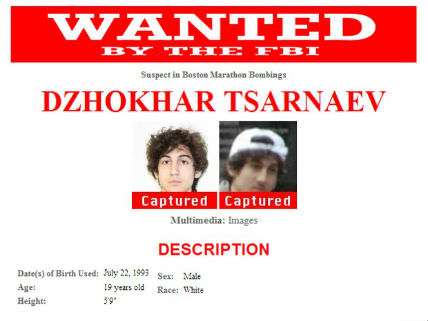The FBI Did Not Need a Miranda Exception to Question Tsarnaev About Ticking Bombs

The lead story in today's New York Times says that in questioning Boston bombing suspect Dzhokhar Tsarnaev before reading him his rights, the FBI invoked "the public safety exception to the Miranda Rule, a procedure authorized by a 1984 Supreme Court decision which in certain circumstances allows interrogation after an arrest without notifying a prisoner of the right to remain silent." But as I pointed out in my column last week, police are always free to question an arrestee before Mirandizing him; it's just that statements elicited by such questioning ordinarily cannot be used to prosecute him. The Times reports that in addition to saying he knew of no additional bombs or terrorist plots during the initial interrogation, Tsarnaev confirmed his involvement in the attack on the Boston Marathon. Without the "public safety" exception, that admission of guilt could not be used against him in court. But given all the other sources of evidence in this case—including video, photographs, witnesses, and leftover bomb-making materials as well as any statements Tsarnaev made after he was read his rights—that exclusion probably would not matter much.
By contrast, in New York v. Quarles, the 1984 Supreme Court case that gave rise to the public-safety exception, the Miranda rule initially led to the dismissal of a weapons charge because police found the suspect's gun after he indicated where he had hidden it in response to a question asked before he was read his rights. As Justice Sandra Day O'Connor pointed out in a concurring opinion, it is not clear that the gun actually had to be excluded based on the Miranda rule as it stood before the Court invented the public-safety exception. "Nothing in Miranda or the privilege itself requires exclusion of nontestimonial evidence derived from informal custodial interrogation," she wrote. In any event, when you look at the details of the arrest it is clear that there was in fact no emergency that made it necessary to ask the suspect about the gun before he was Mirandized. The gun posed no immediate threat, and police would have easily found it if they had simply looked around a little. The Tsarnaev case looks like a mirror image of Quarles. On one hand, there was a plausible public-safety rationale for questioning the arrestee before reading him his rights: a fear of unexploded bombs or imminent attacks. On the other hand, excluding the results of the initial interrogation probably would not have a crucial effect on the suspect's prosecution.
But even in cases involving a true emergency where excluding an un-Mirandized confession would make it substantially harder to convict the suspect, the public-safety exception makes no sense if you accept the logic of Miranda v. Arizona. That decision was based on the recognition that questioning someone in police custody is inherently coercive. Unless the arrestee is clearly informed that he is under no obligation to reply, the Court reasoned, the Fifth Amendment guarantee against compelled self-incrimination is apt to be compromised. The wisdom of that safeguard is confirmed by the very expectation that supposedly justifies the public-safety exception: that a suspect will talk more readily if he thinks he has no choice.
Fear of ticking bombs may have been a good reason to question Tsarnaev before Mirandizing him. But it is not a good reason to admit what he said in response as evidence against him, because the existence of an emergency does not make police custody any less coercive. In fact, the opposite is probably true. Coming to in a hospital and confronted by FBI agents anxious to find out if he knew of any imminent threats, the gravely wounded Tsarnaev may very well have concluded that he had no option but to answer their questions. The next day, after he was informed of his rights and the charges against him, he probably had a different view of the situation. Once a suspect understands that he need not answer questions, critics of Miranda worry, he might clam up. But that is the whole point. There is always the danger that people who know their constitutional rights may choose to exercise them.


Show Comments (12)